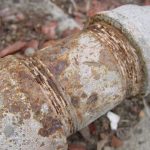Hard water is a common problem in homes throughout America. Approximately 80% of homes in the U.S have a hard water supply. The fault for this problem doesn’t lie with the homeowner or any other person, as it is simply that your area may have mineral heavy water. These minerals are collected as water passes through rocks and soil on its way into underground aquifers or surface water sources. Water containing levels of minerals, particularly calcium and magnesium is rarely considered to be a health risk, but it can leave the water tasting unpalatable. The main issue with hard water is the damage it can cause around your home.
Hard Water and Your Home:
For many homeowners, the first sign that they have
hard water is a white or yellowish residue around plumbing fixtures and drains. This residue is calcite deposits left by the hard water and can be an indication of a greater problem developing inside your drains. As this mineral heavy water is flowing through your pipes, the calcium and magnesium deposits are left on the walls of your pipes. As this accumulation builds up, the volume and water flow inside the pipes is reduced.
Although it is rare for hard water deposits to entirely clog up a pipe, scale accumulation can contribute to a pipe becoming blocked. This is because the scale can make it easier for other substances to accumulate inside the pipe. The larger problem is that the scale accumulation can have a dramatic impact on the water pressure. Restricted water flow increases the pressure inside the pipe making it vulnerable to leaks and causing damage to water using appliances.
Dealing With Hard Water:
If a leak or other form of damage has occurred due to hard water, you will need to call in a professional plumber to correct the problem. Unfortunately, repairing an isolated leak will not correct the underlying issue. The best way to resolve hard water issues is to have your
plumber install a water softener. This type of device uses sodium to balance out the minerals in the water through the process of ion exchange. This means that as water is passed through the softener, sodium ions are introduced while calcium and magnesium ions are retained. The amount of sodium left in the water is very minimal, but if you are on a very sodium restricted diet, there are other water softener models that use potassium instead of sodium.
How Installing a Water Softener Could Protect Your Plumbing:
Your water softener can be installed as a point of entry system. This means that it will be connected where the water supply enters your home and will soften the water supplying all of your faucets, water using appliances and bathroom fixtures. This can correct water pressure issues, scale accumulation and other effects of hard water. Additionally, installing a water softener can help to protect your water using appliances, prolonging their lifespan and reducing the need for costly repairs.
If you are experiencing clogged drains, leaking pipes, compromised water pressure, or any other indications of hard water problems, it is worth considering installing a water softener. Installing a softener will address the underlying cause of your plumbing issues and protect your plumbing.
By Giovanni Longo President Flood Brothers Plumbing
Giovanni Longo is a 3rd generation master plumber who has been practicing his craft and trade in the greater Los Angeles area for well over a decade and a half. A plumbing and hydraulics-engineering innovator, Giovanni’s particular world-class expertise focuses on dealing with challenging sewer system designs as well as resolving complex commercial and residential draining issues. As a certified Flood Mitigation expert, he is also well versed in a wide variety of water damage and remediation solutions.





